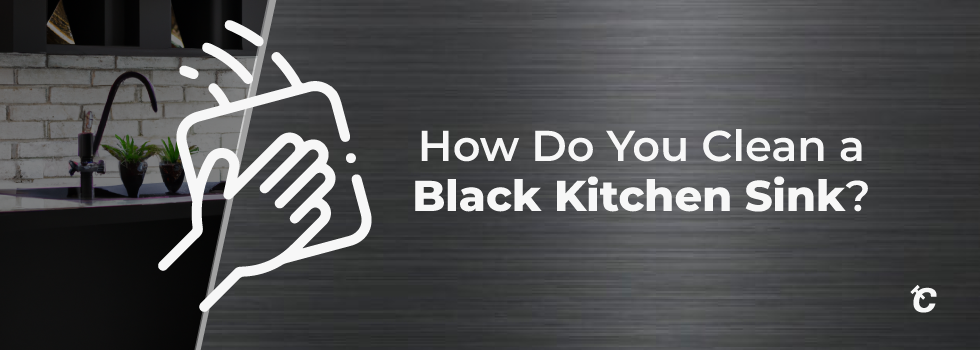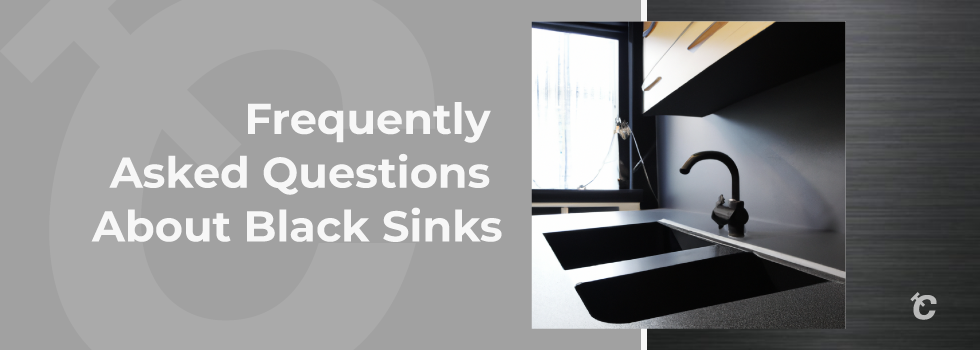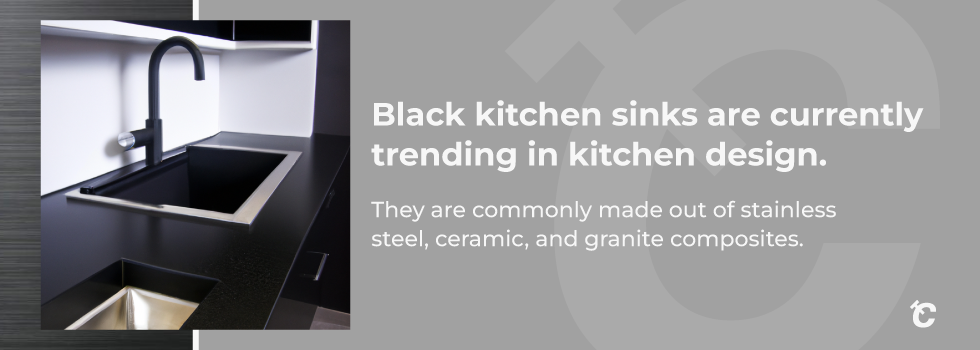Modern and bold, black kitchen sinks aren’t for the faint of heart. Learn how to care for black stainless steel sinks and more.
Since around 2015, all-black kitchens have been very popular, and black kitchen sinks are currently trending in kitchen design. Love them or hate them, these sinks certainly make a major statement.
While a black kitchen sink may not be a practical choice if you’re planning to sell your home anytime soon, they’re a great way to express your personal style and taste. Though the NKBA Design Trends Report predicts that black will be the fourth most popular kitchen sink color over the next few years.
Black kitchen sinks are commonly made out of stainless steel, ceramic, and granite composites. Each material has its pros and cons. We’ll cover what you need to know about black kitchen sinks, which materials are best, how well they hold up, and how to keep them clean.
Black Stainless Steel
Stainless steel is the most popular material for kitchen sinks because it’s highly durable and easy to clean. But if traditional silver doesn’t match your kitchen design, it’s available in other colors, like black. Black stainless steel sinks are the most budget-friendly, though they may not be as long-lasting as other black sinks.
Do Black Stainless Steel Sinks Hold Up?
Black stainless steel sinks can scratch because it's coated stainless steel. So, if you accidentally drop a pot or pan in your sink, you may scratch the finish. Over time, the finish can continue to wear away and show the silver stainless steel beneath. Though, because black stainless steel sinks are less expensive, they are an affordable option that can be replaced over time.
Black stainless steel sinks aren’t prone to peeling, but this is a common problem that people with black stainless steel appliances report. If you’re designing an entire black kitchen with matching appliances, then this is something that you’ll want to keep in mind.
How to Clean a Black Stainless Steel Sink

When cleaning your black stainless steel sink, you’ll want to avoid using any abrasive cleaners or tools. If you use something abrasive, like steel wool, you’ll scratch up your sink. Follow these steps to clean your stainless steel sink:
- Gather gentle dish soap, a microfiber cloth or soft sponge, and warm water.
- First, soak up any water with a cloth towel or paper towel.
- Next, wipe down your sink with warm soapy water and a microfiber cloth.
- Once you’ve rinsed away the water and soap, buff your sink dry with a clean soft cloth to maintain its shine.
While you can clean regular stainless steel sinks with baking soda and vinegar, NEVER use these ingredients on your black stainless steel sink. Abrasive ingredients and acids can wear away the black finish.
Black Granite Composite
Black granite composite sinks are a much more durable choice than black stainless steel sinks. This engineered material is crafted using a mix of granite stone dust and acrylic resins. There are many different styles and colors available, and black granite composite sinks are much more affordable than natural granite sinks.
Do Black Granite Composite Sinks Hold Up?
With proper care, black granite composite sinks can last up to 40 to 50 years. Unlike natural granite sinks, composite granite sinks don’t need sealing. However, you’ll need to do a little bit of upkeep to keep your black composite sink in tip-top shape. To protect your black sink’s coating, apply a cleaner and sealer to the sink with a soft cloth. Once scrubbed clean, finish your sink with a polishing agent from your local hardware store (just check that it’s safe for granite composite sinks).
How to Clean a Black Granite Composite Sink
To prevent chips and scratches, you’ll need to ensure that you’re properly cleaning your black granite composite sink. Fortunately, granite composite sinks are super easy to clean because they’re non-porous. Here’s how you can remove dirt and stains without ruining the finish of your sink:
- First, always check your sink’s manufacturer’s suggestions for cleaning. Because they made the sink, they’ll know best.
- If they don’t have specific instructions, you can usually use mild dish soap, warm water, and a soft cloth or sponge to clean your sink.
- For tough stains, sprinkle baking soda onto the area, add vinegar, and lightly scrub with a soft sponge. Some granite composite sinks can be damaged by heat, so if the area is a result of melted resin, you won’t be able to remove the stain.
- After cleaning, rinse your sink out with warm water. Dry it with a microfiber cloth.
Can You Use Bleach On a Black Composite Sink?
Never use full-strength bleach when cleaning your granite composite sink. This chemical can damage the sink and cause potential staining, which is irreversible.
Black Fireclay
If you love the look of black stainless steel and granite composite sinks but want a more mid-tier option, then black fireclay might be best for your kitchen. Black fireclay sinks are from a mixture of clay and glaze that’s fired at extremely high temperatures. This process makes fireclay sinks very durable.
Do Black Fireclay Sinks Hold Up?
With proper care, black fireclay sinks can last over 20 years. Fireclay is unlikely to scratch or chip, especially if you purchase a high-quality black fireclay sink. Never use harsh cleaners or stain removers on your sink to prevent damaging the finish.
How to Clean a Fireclay Sink
Black fireclay sinks don’t require special cleaning materials to keep them looking spotless. Here’s how to properly clean a fireclay sink:
- First, gently scrub your sink with warm water, dish soap, and a soft sponge.
- If you do have dried materials or stains, mix a little bit of baking soda into your dish soap solution.
- Then, rinse off the soap and water and dry your sink with a microfiber cloth.
If you want to make your black fireclay sink extra shiny, plug the sink and fill it with a 50/50 mixture of bleach and water. Drain the mixture, rinse, and wipe dry.
Frequently Asked Questions About Black Sinks

Do Black Sinks Scratch Easily?
Some black kitchen sinks are prone to scratching, like black stainless steel. Stainless steel is the most likely material to scratch. Scratches on black stainless steel sinks are especially noticeable because they can reveal the silver finish beneath the black coating. Black composite sinks are unlikely to scratch, but sometimes they do. If you place sharp kitchenware in the sink or use abrasive cleaners to scrub the sink, then it may scratch.
To prevent scratches on your black kitchen sink, follow these tips:
- Don’t fill the bottom of your sink with utensils. They can rub together and accidentally scratch the bottom of your sink.
- Don’t use abrasive materials and cleaners. Never clean your black kitchen sink with steel wool and other abrasive cleaners. Always check with your sink’s manufacturer for proper cleaning instructions.
- Use metal grids. While they may take away from your sink’s aesthetic, metal grids can protect the basin of your sink from scratches. Metal grids can prevent sharp knives and silverware from touching the bottom of the sink.
Are Black Sinks Hard to Maintain?
One drawback with black kitchen sinks is it can be hard to see dirt and grime because it may blend into the sink. Some black sinks may show smudges or scratches, but this depends on the sink’s material. Black stainless steel is more resistant to smudges, fingerprints, and water spots. Black granite composite sinks are more likely to show hard water spots and limescale deposits.
It’s important to clean your black kitchen sink weekly to keep it tidy and prevent the need for deep cleaning.
Why Is My Black Kitchen Sink Turning White?
Over time, black kitchen sinks may develop a white haze or white spots, which is caused by hard water mineral deposits. They’re very noticeable on black sinks because of the color contrast. To remove these stains and make your sink black again, your sink needs a thorough cleaning.
First, gently scrub your sink with a mild detergent. Rinse off the detergent and rub in a light coat of olive or mineral oil. These oils can help remove the haze and restore your sink’s shine. Always clean your kitchen sink once a week to prevent buildup.
How Do You Clean a Black Kitchen Sink?
The best way to clean your black kitchen sink depends on the material. But most kitchen sinks, whether matte or shiny, can be cleaned by following these steps:
- First, wipe out any dirt and residue with a wet paper towel.
- Next, gently scrub your kitchen sink with a mixture of warm water and gentle dish soap.
- Then, rinse out your kitchen sink and dry it with a paper towel.
At a minimum, repeat these steps every week to keep your sink clean and prevent deep stains or hard-to-remove residue.
Are Black Kitchens Hard to Keep Clean?
Black kitchens may not show dirt like white kitchens, but they will show water splatters, dust, and food particles. Black cabinets, appliances, and sinks are prone to showing fingerprints and smudges. Just like any other kitchen, black kitchens need to be regularly cleaned to prevent dirt from becoming noticeable. Though, they’re not hard to keep clean. Experts recommend deep cleaning your kitchen at least once a month or four times a year, depending on how often your kitchen is used.
Timeless Alternatives to Black Kitchen Sinks

If you like the dramatic look of a black kitchen sink but aren’t sure you’re ready to commit to such a bold style, then here are two high-end black sink alternatives from CopperSmith.
1. Opt for Aged Copper Instead
Our recycled, aged copper brings warmth to any kitchen space. If you aren’t sold on a black kitchen sink but are interested in a deep, rich color, then copper may be a great choice for you. Discover this rich finish in our Aged Copper Undermount Sink.
2. Choose a Blackened Brass Finish
Instead of a matte black sink, choose a textured finish with dynamic color, like our blackened brass finish (see it in our Farmhouse Kitchen Sink). This model is handcrafted with high-quality metals that are designed to last for decades.
3. Select a Sleek Bronze Copper
If you like the look of a matte black kitchen sink, then our bronze copper finish is for you. Featured on our Farmhouse Kitchen Sink, this sustainable metal naturally patinas over time for a unique look.
No matter what you’re envisioning for your kitchen sink, we will help bring your dream sink to life. Each of our sink styles is fully customizable, so you can choose from finishes, textures, sizes, and much more. Do you want to learn more about other luxurious CopperSmith finishes and sink styles? Contact our team today to receive more information about our finishes above.
